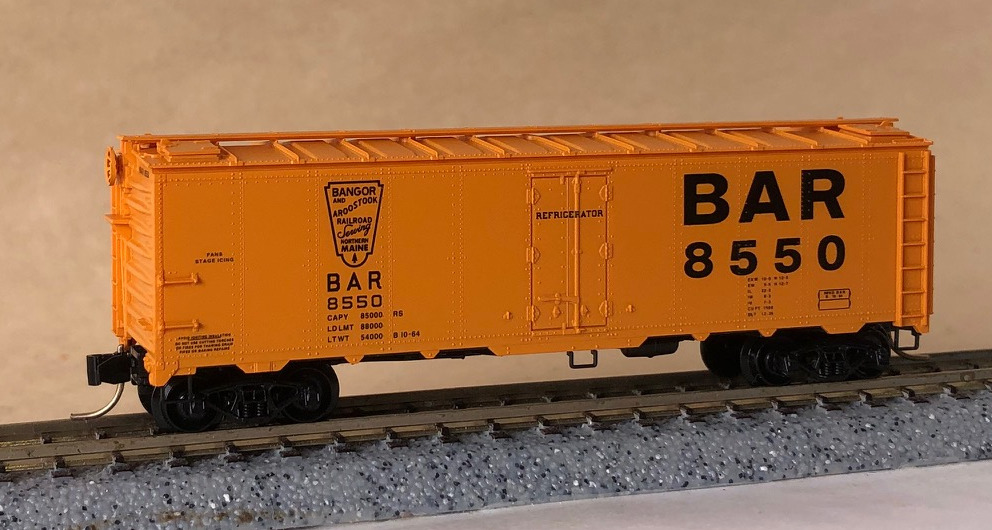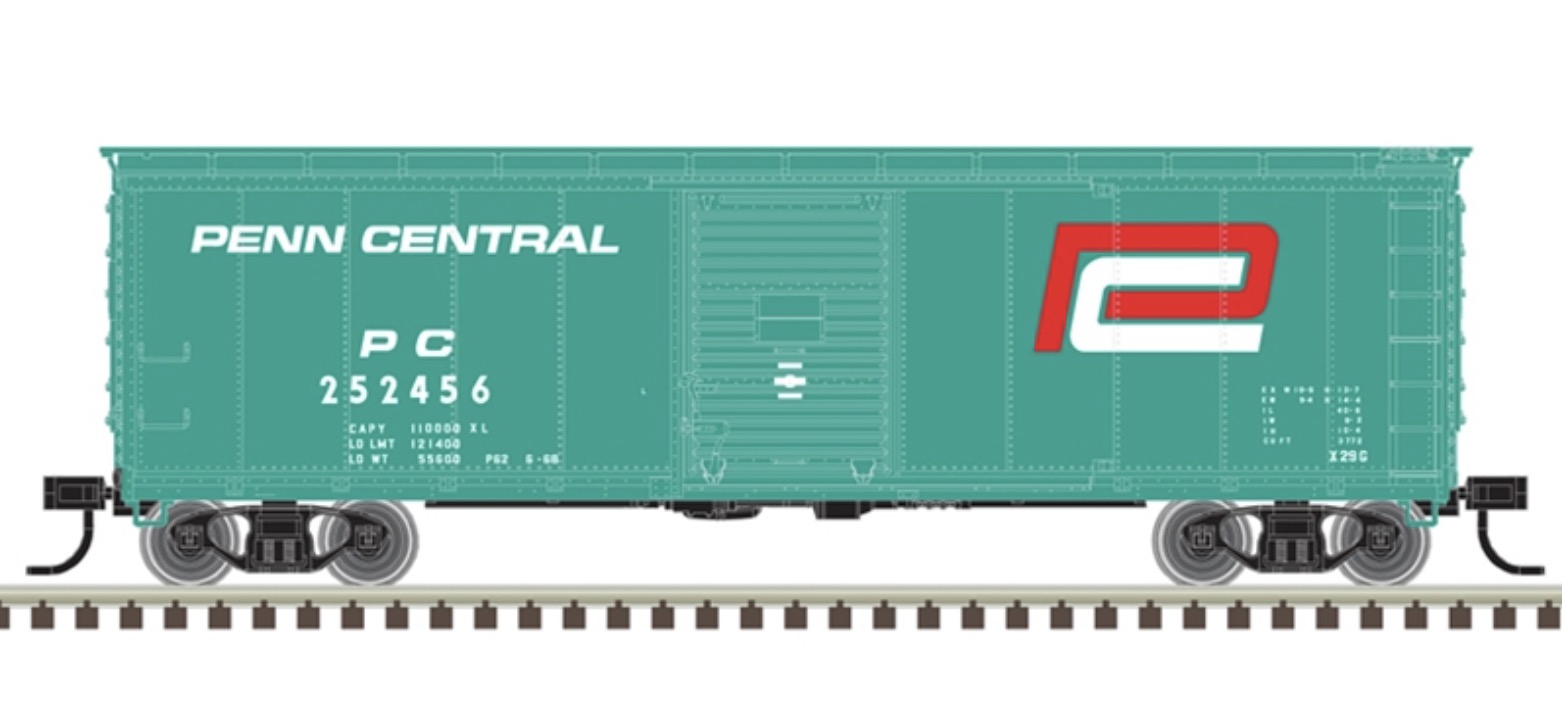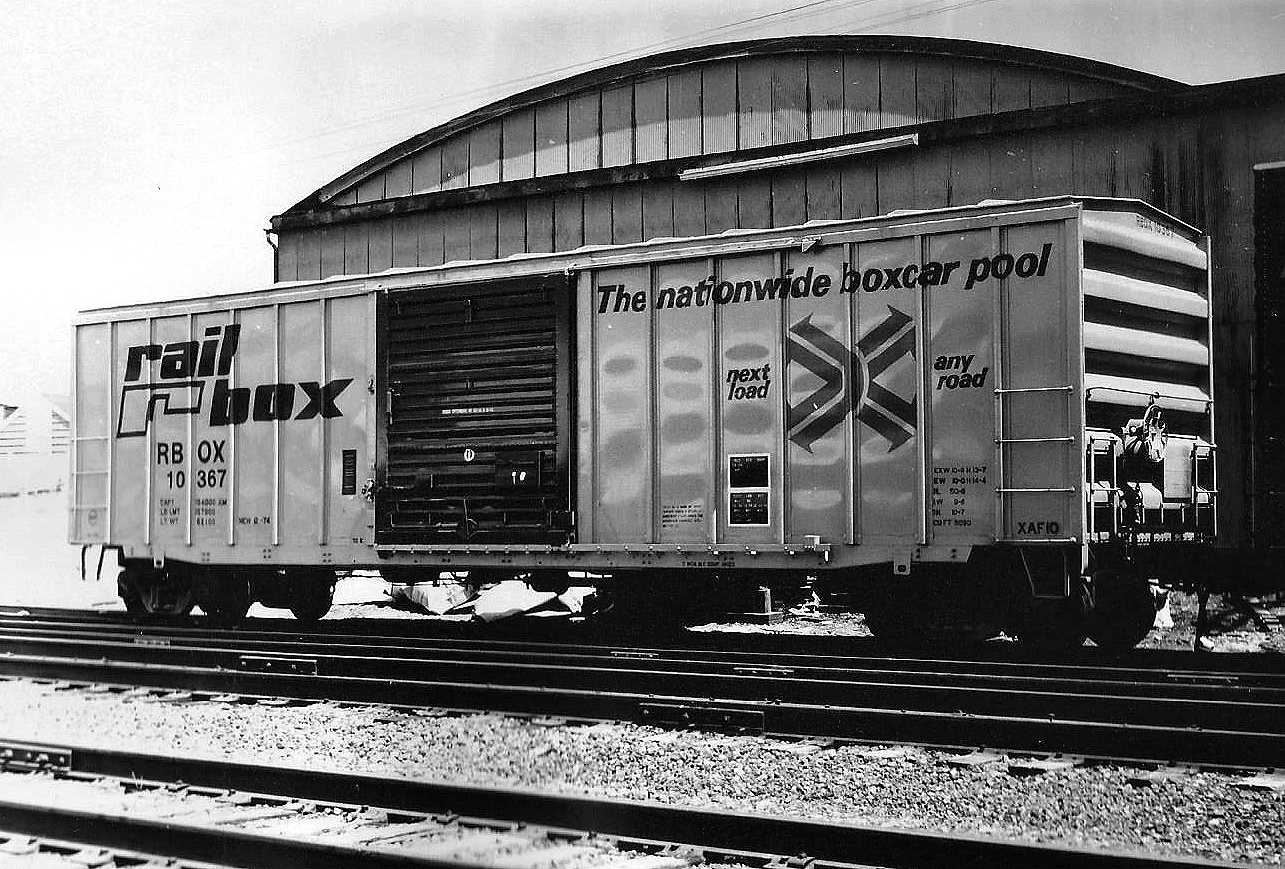Model Information: This model was first produced by Kadee in February of 1981. It is a model of a 50 Foot Steel Rib-Side Single Sliding Door Boxcar. Specifically, this Micro-Trains body style models the FMC 50' 5077 Single Sliding Door prototype. It is also used by Micro-Trains to model Pullman Standard 50' boxcars. Hence on some releases, this car is labeled as a Pullman Standard and in other cases it is labeled as an FMC boxcar, and it also is frequently labeled as a '50' Rib Side Box Car[sic]' with no mention of prototype whatsoever. It appears to be closest to the FMC 5077 boxcar prototype (from the 1970s) in any event. These models can appear with any one of multiple different sliding door types. The doors for this model are operating ones (cool!).
Prototype History: In the 1970's with the growth of the Per Diem business model, FMC produced a series of 50 foot box cars in different configurations. The single-sliding-door configuration is one of the best known and used widely by many different railroads. These cars were produced using the Gunderson metal works which FMC had acquired in 1965. In late 1975, FMC began producing a 5,077-cubic-foot Plate B box car for IPD and Railbox service. FMC's 5077s have seven panels to either side of the 10-foot door, an X-panel roof, and non-terminating ends that are slightly different from those used on FMC's earlier cars. Note how the sidesill is notched all the way back to the bolsters, a key feature of FMC's mature design.
The main difference between the 5077 cu. ft cars built by FMC vs the 5277-5347 cu. ft cars built by the same manufacturers is the overall height of the car, the smaller 5077 cars were Plate B while the larger 5277-5347 cars were Plate C. Over 4,300 cars were produced from 1975-1979 by FMC's Portland, Oregon plant. The cars were delivered in numerous colorful shortline paint schemes, as well as the nationwide car pool fleet of Railbox. Many secondhand cars were later seen in Class 1 railroads and large leasing company fleets under additional shortline reporting marks.
The main difference between the 5077 cu. ft cars built by FMC vs the 5277-5347 cu. ft cars built by the same manufacturers is the overall height of the car, the smaller 5077 cars were Plate B while the larger 5277-5347 cars were Plate C. Over 4,300 cars were produced from 1975-1979 by FMC's Portland, Oregon plant. The cars were delivered in numerous colorful shortline paint schemes, as well as the nationwide car pool fleet of Railbox. Many secondhand cars were later seen in Class 1 railroads and large leasing company fleets under additional shortline reporting marks.
Road Name History: The Chicago, Rock Island and Pacific Railroad (CRI&P RR) (reporting marks RI, ROCK) was a Class I railroad in the United States. It was better known as the Rock Island Line, or, in its final years, The Rock. At the end of 1970 it operated 7183 miles of road on 10669 miles of track; that year it reported 20557 million ton-miles of revenue freight and 118 million passenger-miles. (Those totals may or may not include the former Burlington-Rock Island Railroad.)
Its predecessor, the Rock Island and La Salle Railroad Company, was incorporated in Illinois on February 27, 1847, and an amended charter was approved on February 7, 1851, as the Chicago and Rock Island Railroad. Construction began October 1, 1851, in Chicago, and the first train was operated on October 10, 1852, between Chicago and Joliet. Construction continued on through La Salle, and Rock Island was reached on February 22, 1854, becoming the first railroad to connect Chicago with the Mississippi River.
In 1980 Rock Island was liquidated. The railroad's locomotives, rail cars, equipment, tracks, and real estate were sold to other railroads or to scrappers. William Gibbons (the trustee) was able to raise more than $500 million in the liquidation, paying off all the railroad's creditors, bondholders and all other debts in full at face value with interest. Henry Crown was ultimately proven correct, as both he and other bondholders who had purchased Rock Island debt for cents on the dollar during the low ebb in prices did especially well.
Read more on Wikipedia and Rock Island Technical Society.
Its predecessor, the Rock Island and La Salle Railroad Company, was incorporated in Illinois on February 27, 1847, and an amended charter was approved on February 7, 1851, as the Chicago and Rock Island Railroad. Construction began October 1, 1851, in Chicago, and the first train was operated on October 10, 1852, between Chicago and Joliet. Construction continued on through La Salle, and Rock Island was reached on February 22, 1854, becoming the first railroad to connect Chicago with the Mississippi River.
In 1980 Rock Island was liquidated. The railroad's locomotives, rail cars, equipment, tracks, and real estate were sold to other railroads or to scrappers. William Gibbons (the trustee) was able to raise more than $500 million in the liquidation, paying off all the railroad's creditors, bondholders and all other debts in full at face value with interest. Henry Crown was ultimately proven correct, as both he and other bondholders who had purchased Rock Island debt for cents on the dollar during the low ebb in prices did especially well.
Read more on Wikipedia and Rock Island Technical Society.
Brand/Importer Information: Micro-Trains is the brand name used by both Kadee Quality Products and Micro-Trains Line. For a history of the relationship between the brand and the two companies, please consult our Micro-Trains Collector's Guide.
Manufacturer Information:  Kadee Quality Products originally got involved in N-Scale by producing a scaled-down version of their successful HO Magne-Matic knuckle coupler system. This coupler was superior to the ubiquitous 'Rapido' style coupler due to two primary factors: superior realistic appearance and the ability to automatically uncouple when stopped over a magnet embedded in a section of track. The success of these couplers in N-Scale quickly translated to the production of trucks, wheels and in 1972 a release of ready-to-run box cars.
Kadee Quality Products originally got involved in N-Scale by producing a scaled-down version of their successful HO Magne-Matic knuckle coupler system. This coupler was superior to the ubiquitous 'Rapido' style coupler due to two primary factors: superior realistic appearance and the ability to automatically uncouple when stopped over a magnet embedded in a section of track. The success of these couplers in N-Scale quickly translated to the production of trucks, wheels and in 1972 a release of ready-to-run box cars.
In October 1990 Kadee separated in two companies, with the newly created Micro-Trains® Line Co. continuing the Z, Nn3, and N Scale product ranges, with Kadee retaining the HO range.

In October 1990 Kadee separated in two companies, with the newly created Micro-Trains® Line Co. continuing the Z, Nn3, and N Scale product ranges, with Kadee retaining the HO range.
Item created by: Lethe on 2015-05-31 17:46:30. Last edited by gdm on 2020-07-24 07:29:25
If you see errors or missing data in this entry, please feel free to log in and edit it. Anyone with a Gmail account can log in instantly.
If you see errors or missing data in this entry, please feel free to log in and edit it. Anyone with a Gmail account can log in instantly.










